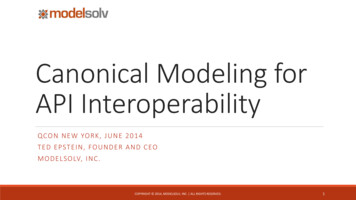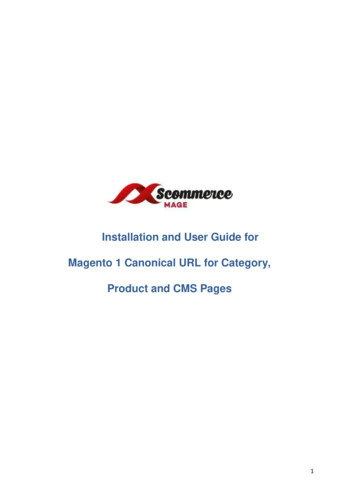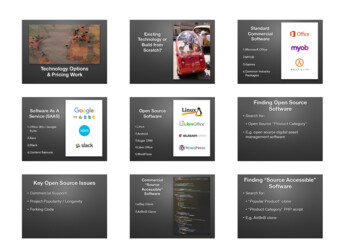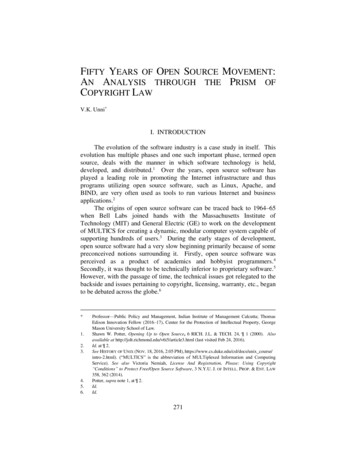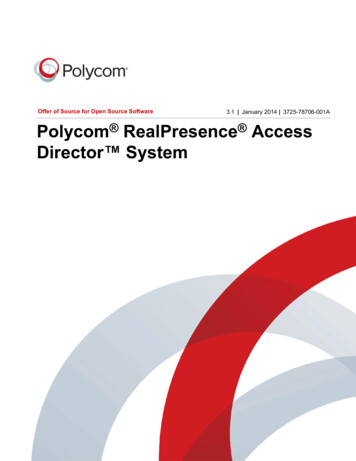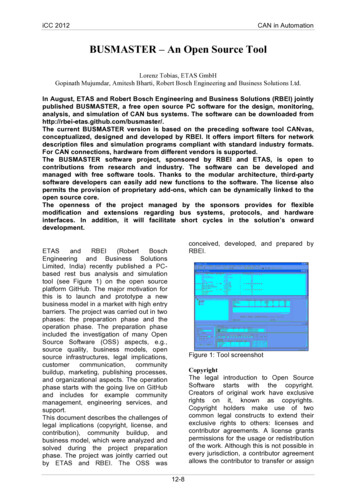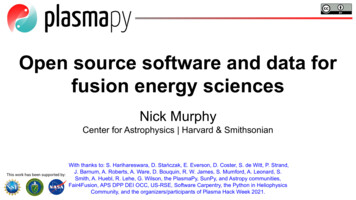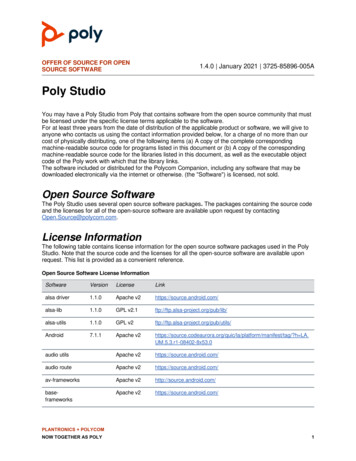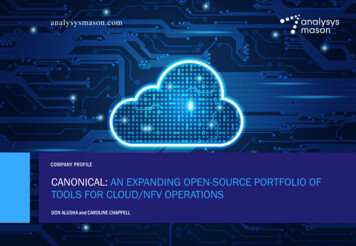
Transcription
Canonical: An expanding open-source portfolio of tools for cloud/NFV operationsanalysysmason.comCOMPANY PROFILECANONICAL: AN EXPANDING OPEN-SOURCE PORTFOLIO OFTOOLS FOR CLOUD/NFV OPERATIONSDON ALUSHA and CAROLINE CHAPPELL Analysys Mason Limited 2017
Canonical: An expanding open-source portfolio of tools for cloud/NFV operationsCompany summaryCanonical is a provider of open-source software technologiesneeded to stand up and manage clouds. Canonical’s tooling helpscommunications service providers (CSPs) to abstract andstandardise the complexities of managing cloud infrastructure andapplications. Operators rely on such tools to create clouds for useby their internal IT and network departments and/or by enterpriseand retail customers.Figure 1: Canonical company factsFoundedHeadquarters in London, United Kingdom.North America: Austin, BostonOfficesCloud management platforms are increasingly based on opensource technologies. Canonical is an emerging and fast-growingplayer in this market, building on its global leadership in Linuxdeployments. The company claims that Ubuntu is the most widelyused Linux distribution when it comes to supporting OpenStack.Canonical is moving up the cloud management value chainbeyond Ubuntu to secure sustainable revenue streams andprofitability across a broader product portfolio.Emerging Asia-Pacific: Beijing, stimated USD110 million (Not disclosed)OpenStack – AT&T, Deutsche Telekom, TelefonicaSelected CSPcustomersUbuntu – Visa, Facebook, MicrosoftKubernetes – Azure, GCE, SamsungDocker – Verizon, GMPartnershipsCanonical is an entrepreneurial company which creates opensource innovations of its own to fill gaps in the open sourcesoftware stacks being developed by the industry at large.1For more information, see Analysys Mason’s Open-source software should be a part of every CSP’sIT vision and planning. Available at: 016. Analysys Mason Limited 2017Europe: Isle of ManDeveloped Asia-Pacific: Taiwan, JapanCanonical boasts an extensive list of Fortune 500 company clientsacross a wide variety of industry sectors, including AT&T, DeutscheTelekom, Sky, eBay and Walmart. The company is seeking toexpand in Asia–Pacific and the telecoms industry remains a keytarget.120042IBM, Dell EMC, Ericsson, Cisco
Canonical: An expanding open-source portfolio of tools for cloud/NFV operationsMarket positioningFigure 2: Canonical’s financial situation FY2017 and current deployment statisticsCanonical is privately held with estimated revenues of USD110million. The company reported a 67% revenue increase in 2017over the previous year as a result of significant new wins, thescaling effect of public cloud in enterprise accounts and theextension of its footprint into new markets such as China.The company said it booked 100 million in deals in 2017. It hasalready achieved market dominance for Linux with more Ubuntuguests in the public cloud than all other distros combined. Now itsees OpenStack as the main driver of its enterprise growth,although it is hedging its bets with Kubernetes.Canonical’s revenue primarily comes from support and licencingcontracts. It has achieved ‘several 7-figure deals’ for its managedOpenStack solution with follow-on support; it receives licensingrevenues from partners such as Dell/EMC, IBM, Ericsson andCisco. Indirect sales, for example, where Canonical is brought in bya prime integrator responsible for building NFV infrastructure,account for less than 20% of the company’s revenues.43% of OpenStackdeployments on UbuntuMarketstrengths andopportunitiesCanonical has ambitious plans to grow the revenues it derivesfrom automating operations from their current low base. Thecompany believes it can capture a USD 1 billion share of a totaladdressable cloud operations market it estimates to be worth USD50 billion.Regional revenue split:25% from UK,15% from JapanSource: Analysys Mason and Canonical Analysys Mason Limited 20173
Canonical: An expanding open-source portfolio of tools for cloud/NFV operationsStrategic directionFigure 3: The principal elements of Canonical’s strategyCanonical believes it has a window of opportunity to define theautomated operations platform for the data centre and distributedclouds. The company aspires to be a market leader in cloudoperations at scale and is investing heavily in this long-termopportunity. Its strategy here centres on its unique tools, MaaS forbare metal configuration which Intel is integrating into itsrackscale designs, Juju for model-driven application deploymentand Snaps for software packaging. Canonical is hoping all threewill become de facto industry standards but Juju in particularfaces fierce competition from approaches such as TOSCA.NFV is a major focus: Canonical is ‘doubling down’ on telco deals,which take longer to win but create long-term customer loyalty. ItsOIL (OpenStack Interoperability Lab) in Boston builds 4000OpenStack clouds a month with over 40 different vendors andhundreds of component variations. OIL is proving critical to telcorelationships: Deutche Telekom, for example, migrated itsOpenStack implementation from Lenovo to HPE equipmentwithout incident and is now in production with a Newton releasethat supports eight different SDNs. Canonical is engaging inprojects to explore the needs of mobile edge computing.Enable cloudoperationsat scaleCanonical is preparing for a cloud native future with support forKubernetes and a differentiated strategy around Docker as well asits own machine containers. Analysys Mason Limited 2017Source: Analysys Mason4
Canonical: An expanding open-source portfolio of tools for cloud/NFV operationsSky selected Canonical to integrate OpenStack into its enterpriseenvironment, enabling it to host a plethora of applications in the cloudBusiness challengeFuture plansSky, the UK satellite and quad-play provider serving around 22.5million customers in 5 countries, wanted to stand up anOpenStack-based IaaS cloud to support multiple business units atlow cost. The cloud needed to run both IT and network workloads,for example, SkyTalk, residential virtual CPE (Sky Q set top box)Sky’s hotspots and Atlas, a video asset transfer system.Sky plans to extend its OpenStack deployment with furthercomponents, including Magnum, Barbican and Sahara,strengthening its support for containerisation, security and bigdata respectively. It is trialling a video transcoding application inthe cloud and expects to continue to expand the scale of thecloud. It is exploring the option of putting separate OpenStackinstances on 80-90 PoPs across its footprint to support CDN andother NFV workloads.Technical solutionSky selected Canonical’s OpenStack distribution to manage itscloud. Canonical’s Mitaka distribution of OpenStack is currentlyrunning in 2 of Sky’s 6 data centres connected via Keystone. Theimplementation supports 7000 CPU cores and 400Tb Cephstorage across 4 availability zones. Hundreds of applications runon the cloud which has 450 users. Sky’s cloud stack isunderpinned by Ubuntu and the KVM hypervisor.Benefits achievedSky recognises that an efficient and scalable cloud is key to theachievement of its business goals. Sky cites the following benefitsfrom using OpenStack and specifically Canonical’s cloud stack: Operational efficiencies: it manages OpenStack with fourpeople and can support the workloads it needs, including NFVworkloads, without having to fork the source code.Assurance tools integrated with OpenStack include HP OpenViewfor event management, OpsView (OS and systems monitoring forcloud-based IT infrastructures), ServiceNow (CMDB and IncidentManager for ticket creation), Altiris (asset management discovery),Qualys and Nessus for compliance/security management, andBMC capacity optimiser for resource utilisation forecasting. Thecompany built a CEO dashboard which provides analytics andstatistics on the cloud and application performance, such is thecompany’s strategic focus on the cloud. Analysys Mason Limited 2017 No licensing costs: the company only pays for Canonical’ssupport. The ability to use cheaper hardware and no SAN ports. It isdriving OpenStack than its VMware enterprise virtualisationplatform, achieving 120% loading on OpenStack compared to90% on VMware. However, the higher risk associated with theseoperational efficiency gains is paying off.5
Canonical: An expanding open-source portfolio of tools for cloud/NFV operationsCanonical’s software product solution overviewFigure 4 : Canonical’s product portfolio overviewLandscape:Systems managementand patchingJuju:Cloud workloaddeployment,integration, scaling,upgradingJujuKVM, LXD, DockerVirtualisationtechnologiesVMs - KVMUbuntu OpenStack:Cloud )Containers cale serveroperating systemDockerKubernetes:Container schedulingand orchestrationLandscapeUbuntu ServerMAASSource: Canonical and Analysys MasonKEYCanonical own productsPartnership Analysys Mason Limited 2017MAAS:Metal-as-Service forbare-metalprovisioning6
Canonical: An expanding open-source portfolio of tools for cloud/NFV operationsProduct summary [1]Figure 5a: Canonical’s productsProductDescriptionUbuntuUbuntu is an Operating System and is Canonical’s flagship product. It leads the market in terms of OpenStack integrations,60 per cent of which are based on Ubuntu. It runs 70 per cent of Docker images, 80 per cent of Azure’s Linux workloads,70 per cent of AWS images and 90 per cent of Cloud Foundry instances.UbuntuLandscapeLandscape is a management tool which gives customers the ability to monitor Ubuntu servers at scale. Via an agentinstalled in each of the Ubuntu servers, it provides continuous monitoring of a system’s health metrics, it defines policies forautomated updates and enables the creation of graphs based on custom metrics.Ubuntu CoreCanonical scaled down the full version of Ubuntu to address the IoT market, and associated management of widelydispersed intelligent devices. The result of this initiative was Ubuntu Core, an IoT-specific OS.Ubuntu Core uses the same kernel and system libraries as the full version of Ubuntu. The development of supplementaryapps using Ubuntu Core is no different from using Ubuntu Classic. The distinction between the versions lies in the wayfunctions are packaged. Ubuntu Core stores application packages in a confined environment using Canonical Snaps, Theyare tamper-proof and read-only images to meet the security requirements of IoT ecosystems.UbuntuAdvantageLaunched in 2010, Ubuntu Advantage is a comprehensive set of services including technical support, access to onlineresources and system management tools. A key component of Ubuntu Advantage is Landscape, the system managementand monitoring tool for easy management of large numbers and diverse platforms.Ubuntu Advantage is available in multiple levels of support across desktop, server and cloud deployments. It thus followsthat there is a flexible pricing structure tailored around the various support tiers.UbuntuOpenStack Analysys Mason Limited 2017Ubuntu OpenStack is the market leading implementation of OpenStack. Ubuntu OpenStack can be managed in anautomated manner using OpenStack Autopilot, a deployment, management and operations tool for large scaledeployments on homogeneous hardware.7
Canonical: An expanding open-source portfolio of tools for cloud/NFV operationsProduct summary [2]Figure 5b: Canonical’s productsProductDescriptionJujuJuju is a tool that supports the creation of abstracted models of application software (‘Charms’). A Charm encapsulatesthe scripts needed for the lifecycle management of an application for example, to instantiate, configure and retire it.Charms are open source and published in a catalogue so that they can be reused, modified and improved by applicationusers. Juju orchestrates Charms at application runtime.BootStackBootStack (build, operate, and optionally transfer) is Canonical’s managed service offering for OpenStack, where thecompany is engaged to design, build and operate OpenStack environments on customer hardware and premises. Canonicalmanages the OpenStack cloud platform for a fixed price. It will transfer management control of the OpenStackimplementation if and when the customer is ready and willing to take it over.KubernetesCanonical partners with Google to deliver an integrated Kubernetes stack for container management. Kubernetes can bedeployed across private, public, and hybrid environments on a variety of infrastructures spanning VMWare, OpenStack andits own bare metal cloud, MAAS.MAASMAAS (Metal As A Service) offers complete automation of physical servers by treating them like virtual machines, therebyturning bare metal into elastic cloud-like resource. MAAS can be loaded via a PXE interface or alternatively it can beintegrated with other technologies. Canonical’s Juju complements MAAS, since the latter manages physical serverswhereas Juju manages the applications running on those servers.LXDLXD is a container management system for Linux environments which applies many of the properties of a hypervisor to thecontainer environment. In a bare metal environment, an LXD container provides full ‘machine’ system performance,comparable to that of the Host OS. Canonical provides enterprise support for LXD through Ubuntu Advantage. Analysys Mason Limited 20178
Canonical: An expanding open-source portfolio of tools for cloud/NFV operationsSignificant customers in the telecoms industryFigure 6: Canonical’s key telecoms customersCustomerCountryScopeSkyUKSKY engaged Canonical to provide them with an IaaS cloud for enterprise environment. To that end, Canonical integratedOpenStack into Sky’s technology infrastructure. Specifically OpenStack was deployed into two data centres wherehundreds of applications are hosted.AT&TUSAT&T selects Canonical to provide it with Ubuntu OS and engineering support for AT&T’s cloud, network and �s OpenStack implementation is based on Ubuntu.ColtTechnologyServicesUKColt engaged Canonical in a OpenStack proof of concept trial in first step to understand and explore a SD-WANdeployment.EtisalatUAEEtisalat deployed its cloud-based infrastructure based on the Canonical Ubuntu OpenStack platform. Etisalat is utilisingCanonical’s Juju services modelling product to manage its NFV Cloud.Tele2EuropeTele2 deployed Canonical’s BootStack as its managed cloud platform where Canonical will design, build and manageCanonical’s OpenStack clouds across Tele2’s operating technology estates.Bell CanadaCanadaBell is using OpenStack to manage over 6000 nodes which are running lightweight VNFs (load balancers and firewalls). Analysys Mason Limited 20179
Canonical: An expanding open-source portfolio of tools for cloud/NFV operationsAnalysis: strengths, weaknesses, opportunities and threatsST R EN GT HSOPPOR TUNITIES Canonical has a strong installed base to which it can offer additionalproducts since Ubuntu is deployed so widely. Canonical has an opportunity to help CSPs that lack relevant expertise incloud operations with NFV automation, given its track record, tools andcapabilities in this area. Canonical has advanced automation capabilities enabled by unique toolsand services including MaaS, Juju and BootStack. Canonical’s association with cutting edge technologies such as AI,autonomous cars and AWS Greengrass gives it the opportunity topresent itself as the cloud stack of choice to operators wanting to be atthe forefront of market innovation. Canonical’s flexible pricing structure based on multiple variables makesit attractive at a time when operators wish to experiment with newpricing structures and business models. Canonical’s OpenStack Interoperability Lab (OIL) enables it todemonstrate its facility in building OpenStack clouds as well as providinga valued testing service in a market with a heterogeneous infrastructureenvironments. Canonical is one of a handful of companies that can provide a migrationpath from OpenStack to full cloud native computing for operators andVNF vendors.WEAKN ES S ESTHR EATS Canonical is not as long-established as rival open source companies so itlacks an extensive partner network to extend its market reach. Operators may withdraw from using open source components given thecultural issues and other challenges associated with deploying themversus commercial products. Canonical is heavily reliant on its Ubuntu Linux distro for revenues andprofits and has not made a significant market impact yet with othersolutions in its portfolio. Canonical faces stiff competition from companies such as Red Hat andSuse; the former is larger with more resources and a stronger marketpresence, whereas the latter has more experience in developing andselling software solutions. Canonical’s overall lack of profitability is a concern since it casts intodoubt its long-term ability to fund innovative product developmentcompared with competitors such as Red Hat. Canonical does not yet tell a coherent story around operationalautomation, despite having excellent point tools. Analysys Mason Limited 201710Canonical is betting heavily on its Juju automation tool while the telcomarket is favouring TOSCA, which is gaining traction and presence inmarket initiatives such as ONAP due to its status as an industrystandard.
Canonical: An expanding open-source portfolio of tools for cloud/NFV operationsAbout the authorsDon Alusha (Analyst) is part of the OSS practice in Analysys Mason's Telecoms Software Research team, contributing to the Service Fulfilment,Service Assurance, Software-Controlled Networking and Network Orchestration research programmes. His areas of interest include computerand network security, the digitalisation of communications service providers’ (CSPs’) systems, and the evolution of software architecture incloud computing deployments. He holds an MSc with Distinction in Computing, IT Law and Management from King’s College London, and a firstclass honours BSc degree in Business Computing Systems from City, University of London.Caroline Chappell (Principal Analyst) is the lead analyst for Analysys Mason's Software-Controlled Networking research programme. Herresearch focuses on service provider adoption of cloud and the application of cloud technologies to fixed and mobile networks. She is a leadingexponent of SDN and NFV and the potential that these technologies have to enhance business agility and enable new revenue opportunities forservice providers. Caroline investigates key cloud and network virtualisation challenges, and helps telecoms customers to devise strategies thatmitigate the disruptive effects of cloud and support a smooth transition to the era of software-controlled networks. Caroline has over 25 years’experience as a telecoms analyst and consultant. Analysys Mason Limited 201711
Canonical: An expanding open-source portfolio of tools for cloud/NFV operationsAnalysys Mason’s consulting and research are uniquely positionedCONSULTINGAnalysys Mason’s consulting services and research portfolio We deliver tangible benefits to clients across the telecomsindustry: communications and digital service providers, vendors,financial and strategic investors, private equity andinfrastructure funds, governments, regulators,broadcasters, and service and content providers. Our sector specialists understand the distinct local challengesfacing clients, in addition to the wider effects of global forces. We are future-focused and help clients understand thechallenges and opportunities that new technology brings.RESEARCH Analysys Mason Limited 201712 Our dedicated team of analysts track and forecast thedifferent services accessed by consumers and enterprises. We offer detailed insight into the software, infrastructure andtechnology delivering those services. Clients benefit from regular and timely intelligence, and directaccess to analysts.
Canonical: An expanding open-source portfolio of tools for cloud/NFV operationsResearch from Analysys Mason Analysys Mason Limited 201713
Canonical: An expanding open-source portfolio of tools for cloud/NFV operationsConsulting from Analysys Mason Analysys Mason Limited 201714
Canonical: An expanding open-source portfolio of tools for cloud/NFV operationsPUBLISHED BY ANALYSYS MASON LIMITED IN DECEMBER 2017Bush House North West Wing Aldwych London WC2B 4PJ UKTel: 44 (0)20 7395 9000 Email: research@analysysmason.com www.analysysmason.com/research Registered in England No. 5177472 Analysys Mason Limited 2017. All rights reserved. No part of this publication may be reproduced, stored in a retrieval system or transmitted in any form or by any means – electronic,mechanical, photocopying, recording or otherwise – without the prior written permission of the publisher.Figures and projections contained in this report are based on publicly available information only and are produced by the Research Division of Analysys Mason Limited independently of anyclient-specific work within Analysys Mason Limited. The opinions expressed are those of the stated authors only.Analysys Mason Limited recognises that many terms appearing in this report are proprietary; all such trademarks are acknowledged and every effort has been made to indicate them by thenormal UK publishing practice of capitalisation. However, the presence of a term, in whatever form, does not affect its legal status as a trademark.Analysys Mason Limited maintains that all reasonable care and skill have been used in the compilation of this publication. However, Analysys Mason Limited shall not be under any liability forloss or damage (including consequential loss) whatsoever or howsoever arising as a result of the use of this publication by the customer, his servants, agents or any third party. Analysys Mason Limited 2017
Canonical is an entrepreneurial company which creates open source innovations of its own to fill gaps in the open source software stacks being developed by the industry at large.1 Company summary 1 For more information, see Analysys Mason's Open-source software should be a part of every CSP's IT vision and planning.
